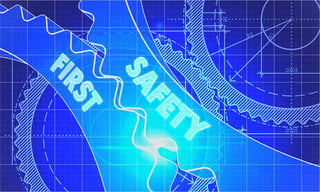
Hydraulic fluid may seem relatively harmless to work with -- until it is pressurized. In this Shop Talk Blog post, we are going to take a look at why hydraulic fluid under pressure is so dangerous, what happens when you come into contact with it, and what you can do to minimize those dangers when you're on the job.
Note: If you're working with pressurized hydraulic fluid and feel a prick (like electricity) on your skin, please seek medical attention right away.
Potential Issues with Hydraulic Fluids
Extended exposure to mineral oil hydraulics fluids has, in rare cases, caused weakness in the hands and arms. Some people may have an allergic reaction if their skin comes into contact with certain hydraulic fluids. Of course, common sense tells us we shouldn't drink hydraulic fluid or put it in our eyes. The type of hydraulic fluid used with construction equipment isn't dangerous for most people until it is pressurized.
Hydraulic Fluid Injection
A stream of hydraulic fluid under as little as 100 psi of pressure can penetrate your skin. This type of injury is called hydraulic fluid injection. The first recorded case of a high pressure injection injury was back in 1925. Note that such injuries don't just occur with hydraulic fluid; they can involve grease, diesel, paint, and even water.
Most people who have experienced hydraulic fluid injection claim that it initially feels somewhat like a bee sting or a wire prick. The entry site may be so tiny that it looks like a pin prick -- but major damage can occur. Other wounds might be larger and look like cuts or tears in the skin. Within a few hours people report pain, swelling, and redness. Numbness and throbbing rapidly follow, and after six hours you will know you've been seriously injured. Untreated, hydraulic fluid can result in compartment syndrome, necrotic tissues, amputations, and even death.
Preventing Hydraulic Fluid Injection
Do not use your hand to locate a leak if you want to avoid an injection injury. Many technicians will run their hand over a hose that is suspected of a leak, and if they can't find one they may ramp up the pressure until they do. This is not a safe practice. There are other ways to locate hydraulics, such as using a piece of cardboard in place of your hand. Don't expose you hand or arm to potential leaks.
Loosening or tightening lines that are under pressure can also cause injection injury. An especially unsafe practice is opening lines to bleed air from cylinders. Any time high pressure lines are going to be disconnected, the pressure needs to be bled from the system. There are also gloves that can minimize the effects of hydraulic fluid injection.
What To Do If You Experience Hydraulic Fluid Injection
Injection injuries don't always cause problems immediately. If you have come into contact with pressurized hydraulic fluid, see a doctor right away. It may not look like a problem, but hydraulic fluid contains chemicals that are toxic to the human body and will kill human tissue. Keep in mind that emergency surgery may be required to save as much tissue as possible after an injection injury.
Conclusion
Texas Final Drive is your partner in providing new or remanufactured final drive hydraulic motors from a single mini-excavator to a fleet of heavy equipment. Call today so we can find the right final drive or hydraulic component for you, or check out our online store to find your O.E.M. manufacturer brand motor now.

